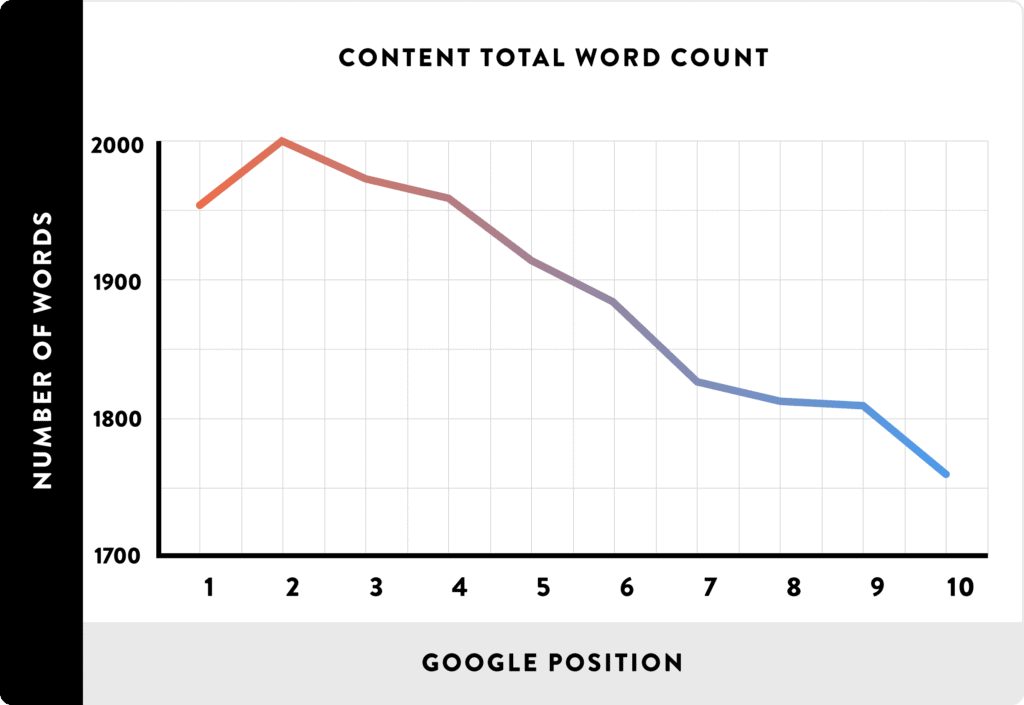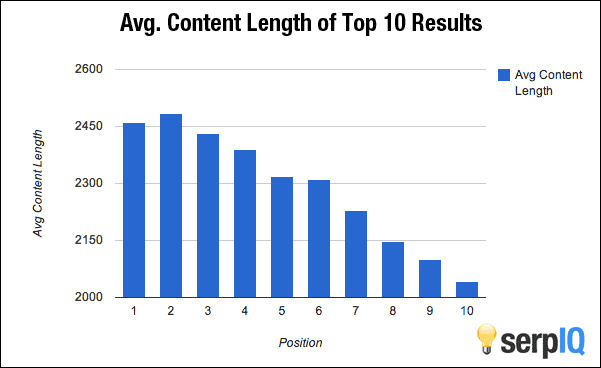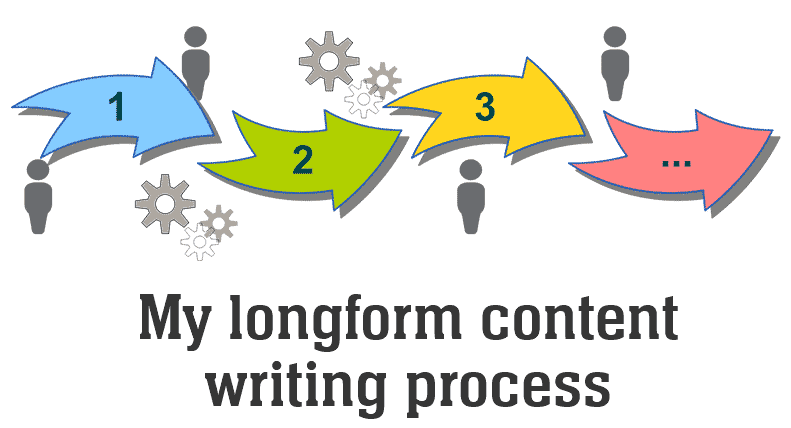Improve your SEO faster by publishing longer blog posts or long form content.
Looking for a long form content writer?
Table of contents
- Why publish long form content and why does it matter?
- Can you trick Google into believing that you are writing and publishing long form content by simply repeating sentences and paragraphs?
- 17 benefits of long form content writing longer blog posts.
- My long form content writing process.
- How to choose a content writer for your longer blog posts or long form content writing needs?
- The biggest challenges faced by long form content writing.
Here is a Google Webmasters Central blog update that was published back in 2013 that recommends longer blog posts and in-depth articles to improve your search engine rankings.
Most of the SEO tools these days make you write more than 2000-2500 words when writing webpages, articles, and blog posts.
If you are looking for a content writing service that can help you publish high-quality long form content and longer blog posts of 2000, 3000 or 4000 words, I can provide you well-researched content on an ongoing basis.
Some examples of long form content are:
- In-depth blog posts and articles
- E-books
- Case studies
- Email series
Right now, I’m writing long form content for the following business sectors:
- Web design and development
- Mobile app development
- Blockchain technology and cryptocurrency
- Technology in general
- Business processing
- SEO
- Internet/digital marketing
- Real estate

Why publish long form content and why does it matter?
According to a Kissmetric report, people spend 40% time more on blog posts and articles that are more than 2000 words.
The SEO company Backlinko analyzed 1 million Google search results and found that the average length of the results that are featured on Google’s first page is 1890 words. Here is a graph from Backlinko:
A SerpIQ study found a direct correlation between the length of the blog posts and web pages and their respective search engine rankings. Given below is a graph:
One of the biggest SEO companies Moz did a research on more than 1 million links. This was their observation:
85% of content published (excluding videos and quizzes) is less than 1,000 words long. However, long form content of over 1,000 words consistently receives more shares and links than shorter form content. Either people ignore the data or it is simply too hard for them to write quality long form content.

Emphasis mine.
Long pieces of content convey to Google that you have enough knowledge to pack every possible bit of information into a single blog post.
It convinces Google that once someone visits this particular piece of long form content, he or she is going to get possibly every bit of information he or she is looking for.
Why is it so?
It works something like this:
- A person searches for something on Google.
- She finds your link and clicks it.
- She comes back to Google and carries on with the same search term or something similar.
- She goes on exploring your website and doesn’t use the same search term or something similar back on Google.
The 3rd point tells Google that she didn’t find on your website what she was looking for and hence, your link doesn’t solve the purpose of the keyword it is currently being ranked for. The ranking is reduced.
The 4th point tells Google that, since she no longer searches for the same information on Google, she was able to find the information she needed on the link. The link solves the purpose of the keyword it is currently being ranked for. The ranking is further improved.
Longer blog posts mean authoritative content.
The general perception on the Internet is that people these days don’t have enough patience to go through longer blog posts, but as a content writer, I have often observed that it depends on the seriousness of the concerned business.

This Pew study found out that as long as your content is authoritative and informative, it doesn’t matter whether people are accessing it on their PCs and laptops or mobile phones, they read it.
B2B business managers prefer to read a lot before they make a decision because after all, they will be investing lots of money and time in a particular partnership. If they cannot spend half an hour knowing about the company or the product/service they are going to deal with, how can they have enough patience to do business?
Through my content writing services, I constantly provide long form content to my B2B clients because they understand the importance of including lots of information to educate and inform their prospective business partners.
Shorter blog posts are easier to create. Since they are easier to create, people tend to overdo. This reduces the quality of the content they publish.
Also, creating short blog posts doesn’t require in-depth knowledge. Even if you use lots of information in those 500 words, Google assumes that since you’re not creating a longer blog post, you don’t have much to say.
Therefore, Google and other search engines have started preferring longer, authoritative blog posts and articles.
An increasing number of businesses are using longer blog posts, or long form content to improve their SEO.
Since everybody runs behind short-short-short, publishing very comprehensive, long blog posts and articles can help you stand out.

Even Google considers shorter blog posts and articles as “thin content” and often penalizes you, because it is easier to write and publish 500-word blog posts. Pay someone $ 5 and you have got yourself the so-called “SEO article”.
SEO experts and online marketers often, mistakenly, stuff websites with lots of shorter blog posts and articles, even if unknowingly, indulging in spam rather than actually improving search engine rankings.
It is assumed that when you publish longer blog posts and articles, you are an expert. Only an expert would have so much to say about a topic.
People who go for shorter, “thin content” neither have the expertise nor the in-depth knowledge required to create lengthy pieces of scholarly material.
Long form content is often accompanied by lots of data, graphics, images and resources. It has different sections explaining the topic from different angles. It is very comprehensive. Whatever information you may need on a topic, you will get it on a longer, authoritative blog post.
Can you trick Google into believing that you are writing and publishing long form content by simply repeating sentences and paragraphs?
You can try and see how it works. After all, you do and learn and then you relearn.
My logic behind advising you against this tactic is that, people behind the ranking algorithm are quite smart.
They can make out repetitive patterns. They can also make out repetitive and related patterns.
They use very complex algorithms, prepared by over 300 maths PhDs who are constantly refining the ranking algorithm to handle exactly such situations.
This will be straightaway termed as spamming. Remember that once your domain is blacklisted or blocked, it is very difficult to get it back on its feet. You may lose your listings for ever. Is it worth it?
There are reasons why Google gives so much importance to long form content:
- Longer blog posts weed out those who simply want to publish blog posts to improve search engine rankings for different keywords and consequently, end up publishing lots of inferior-quality content.
- Long form content provides authoritative, comprehensive and “complete” solutions to the search engine users, giving them better results.

17 benefits of long form content or writing longer blog posts
- Better search engine rankings in a short time.
- Greater subject authority.
- More social sharing.
- Domain authority increases.
- Keyword density increases.
- Subject quality improves.
- You get competitive edge over businesses who cannot find better writers.
- You create more social media buzz.
- People are awed by your effort.
- You enjoy greater brand authority.
- You end up writing and publishing more evergreen content.
- Bounce rate decreases because people spend more time reading your authoritative blog posts.
- Long form content can be repurposed into guide books and e-books.
- Boosts your credibility.
- Overwhelms your competitors.
- You establish thought leadership.
- Greater number of inbound links/back links.

My content writing process
1. Thoroughly understanding your audience
It is very important to understand your audience before kick-starting the researching and writing process.
Every piece of content is written for the purpose of consumption by your target audience.
Remember that although you are investing in long form content to improve your search engine rankings, these rankings have no meaning unless your content urges people to do business with you.
In this regard, it is very important to know the “search intent”. Why would people come to this link? What do they want to achieve? What is their intent?
People may search to
- Gain knowledge.
- Improve their understanding.
- Gather information and research.
- Buy a product or a service
Then, your content is created accordingly.
2. Deciding on the most appropriate longtail keyword to focus on for your longer blog post
I normally don’t deal with SEO for primary keywords because that’s the job of some SEO company. I write content for longtail keywords, the actual search queries people make.
Longtail keywords are more effective for long form content because
- They are easier to rank.
- Much information can be found and packed.
- They serve search intent better.
If you are getting your content written for your business blog, it is better to concentrate on longtail keywords that have the “buyer intent” – people would like to buy after reading your content.

The heading of the title of your longform blog is created accordingly.
3. Research and data gathering
Research and data gathering are very important for long form content writing. If you intend to write so much, you have to back your claims with authoritative data – research and findings of professional agencies.
Longer blog posts are scholarly. Their primary purpose is to convey your authority over your field and your ability to convey ideas with facts.
If you are a renowned figure in your field, you can use the facts coming from your own organization, otherwise, you can use external resources.
Research and data gathering also adds weight to what you’re trying to communicate.
For example, from this web page, I have linked to many authoritative studies to show how effective long form content is in terms of increasing your conversion rate and improving your SEO.
4. Internal backlinking during long form content writing
Already got great blog posts and articles within your website? Awesome.
Your longer blog post gives you ample opportunity to link to your existing content.
This improves interlinking and also helps you highlight less-popular blog posts and articles through your long form content that will have a greater success rate compared to those less-popular blog posts and articles.
5. The actual writing process that should be engaging and conversational
It’s not the length of your content that bores people, but the use of heavy words.
Although some clients insist that I use “peculiar language” replete with industry jargon, I use technical words and jargon only when necessary.
For example, many Internet marketers throw around words like KPIs and metrics. They seem like jargon, but it doesn’t mean when I need to use them I don’t use them. I do.

But I mostly use a conversational style. Easy-going writing.
Goes without saying that the language is decent and professional because you don’t want to sound as if you don’t care for your readers.
6. Revision and final drafting
Once I have completed writing the longer blog post I normally share it with the client through a Google Docs document. He or she gives the feedback, comments and revision suggestions and I make the changes accordingly. That’s it. The document then can be published.
How to choose a content writer for your longer blog posts or long form content writing needs?
Remember that to publish longer blog posts that are well researched and authoritative, you cannot work with just any writer. Your writer needs to be an actual writer, not one of those writers who create profiles on freelancing websites and then write bulk articles and blog posts.
What do you need to be careful about when choosing a content writer for your longer blog posts or long form content writing needs?
Your writer will need to
- Research.
- Compile data.
- Create a narrative around that data and information.
- Write it in an easy-to-understand format.
- Keep it engaging and free-flowing.
- Write in a manner so that no section on your blog post seems unnecessary or irrelevant.
- Maintain quality for 2500-3000 words.
- Keep in mind your SEO needs.

Now, all these attributes require talent, intelligence, extreme comfort level with the language he or she is writing in, and experience.
Again, anyone can claim to have these capabilities.
This is where you will need to do a bit of research.
Most of those short-blog-post writers don’t maintain their own blogs and websites. If they could work this hard, they wouldn’t create cheap content.
Maintaining a blog and a website that are constantly updated takes effort, dedication and extreme levels of perseverance.

These attributes can only be found in a writer who is used to working hard and who understands the importance of high quality, authoritative content.
My rule of thumb is, choose a content writer for your long form content writing needs, or even otherwise, who writes regularly and who doesn’t shy away from writing about his or her skills.
Stay away from a content writer who wants to write only when he or she is paid. I’m not saying force your content writer to write for free for you. No.
What I’m saying is, take for example my own blog, or my website. I’m continuously publishing here content.
Sometimes I also publish content on other websites. Do I get paid for that?
No.
I write for visibility. I write to improve my search engine rankings.
I also write to educate my prospective clients so that they can make their own decision regarding my content writing and content marketing services.
So, when I’m continuously writing for my own blog and for other blogs, I’m continuously honing my skills. I will use these skills to write better content for you.
The biggest challenges faced by long form content writing
Writing compelling long form content comes with lots of challenges. Navigating extensive research takes lots of effort. We also need to maintain a balance between crafting a captivating structure.
You need to create a depth without wordiness. As a long form content writer, one needs to be tight deadlines, manage time well and still deliver top-notch long form content.
Sustaining reader interest throughout, seamlessly integrating SEO, and incorporating visuals demand creative prowess.
One needs to maintain originality and simplify technical details. Balancing don’t consistency across diverse platforms and adapting to evolving trends brings further complexity.
Another challenge is mobile optimization. Despite writing long form content, you need to make it easier to read on all mobile devices. Formatting helps a lot.
Listed below are some challenges faced by a professional content writer when writing long form content.
Long form content writer – Information Overload
Navigating through a sea of information to unearth the most crucial insights can be akin to a treasure hunt. It demands a discerning eye to separate the gems from the pebbles and present readers with content that truly matters.
Structural Puzzle – writer for long form content
Building a coherent and engaging narrative is comparable to constructing a carefully crafted puzzle. Each piece, or paragraph in this case, should seamlessly fit into the overall framework, guiding readers on a logical and captivating journey.
Focus Challenge
Staying on course amid the vast expanse of a topic requires a constant reminder of the core theme. It’s about steering away from tangents and ensuring that every aspect contributes meaningfully to the central narrative. Long form content writing.
Long blog posts – fish Trimming the Fat
Achieving conciseness without sacrificing substance is an art. Every word must serve a purpose, contributing to the richness of the content without unnecessary padding or verbosity.
Time Tug-of-War – writer for long form content
Writing lengthy pieces under time constraints is a delicate balancing act. Juggling multiple projects while adhering to deadlines demands efficient time management and the ability to maintain quality amidst speed.
Reader Engagement Quest
Holding the reader’s attention throughout a long-form piece is an ongoing quest. It involves strategically placing hooks, anecdotes, and interactive elements to ensure that each section is an engaging pitstop on the reader’s journey.
Editing Rollercoaster – long blog posts
The process of editing is akin to sculpting a masterpiece. It involves chiseling away redundancies and refining the content, all while preserving the essence and energy that makes the piece unique.
SEO Ballet
Integrating SEO seamlessly is like performing a ballet; it requires grace and precision. The challenge lies in incorporating relevant keywords organically, ensuring that the content is search engine-friendly without compromising its natural flow. Long form content writer.
Visual Symphony
Creating a visually appealing layout is comparable to orchestrating a symphony for the eyes. The interplay of words and images should harmonize, enhancing the overall aesthetic and contributing to a delightful reading experience.
Originality Odyssey – writer for long form content
Crafting original perspectives is a continuous journey. It involves navigating through familiar territory with a fresh lens, offering readers a unique viewpoint that distinguishes the content from commonplace narratives.
Transition Tightrope
Connecting ideas seamlessly is crucial for maintaining a cohesive narrative. It’s about guiding readers smoothly from one thought to the next, ensuring a fluid and enjoyable reading experience.
Simplicity Struggle
Simplifying complex concepts requires finesse. It’s about presenting intricate ideas in a way that is accessible to a broad audience without oversimplifying or losing the essence of the subject matter. Long form content writing.
Citation Ballet
Citing sources is not just acknowledgment; it’s a dance of credibility. Ensuring proper attribution while adhering to citation standards adds a layer of complexity to the writing process. Long form content writer.
Tone Tango
Maintaining a consistent tone is akin to dancing; it’s about rhythm and harmony. Establishing a voice that resonates with the audience throughout the entire piece is essential for building trust.
Platform Flex
Tailoring content for various online platforms is like adapting a performance for different stages. It requires understanding the unique characteristics of each platform and adjusting the content accordingly. Writer for long form content.
Engagement Riddle
Encouraging reader interaction involves more than just presenting information. It’s about inviting readers to become active participants, fostering a sense of connection and community.
Feedback Waltz
Incorporating feedback is a dance of improvement. It’s about embracing constructive criticism, learning from it, and refining the content to enhance its overall quality.
Relevance Puzzle
Staying relevant in a rapidly evolving landscape is a puzzle to solve continually. It demands a keen awareness of current trends and a proactive approach to adapting content to meet evolving audience needs. Long blog posts writer.
Pacing Poetry
Achieving the right pacing is akin to composing poetry. It involves finding the rhythm that keeps readers engaged, not rushing through the content but allowing it to unfold with a natural ebb and flow.
Mobile Ballet
Ensuring content is mobile-friendly requires a nimble dance. It’s about adapting to different screen sizes and functionalities, ensuring a seamless reading experience on various devices.
Fact-Check Vigil
Verifying information is a vigilant task. It’s about standing guard against inaccuracies and upholding the integrity of the content by ensuring the facts presented are accurate and reliable.
Procrastination Trap
Overcoming the temptation to procrastinate is a constant challenge. It involves maintaining discipline, staying focused, and adhering to timelines to ensure consistent progress. Writer for long form content.
Vocabulary Symphony
Diversifying language is like composing a symphony of words. It’s about expanding the vocabulary to keep the content engaging and dynamic, avoiding monotony or over-reliance on certain terms.
Platform Handcuffs
Navigating platform constraints is akin to escaping creative handcuffs. It’s about turning limitations into opportunities for innovation, adapting to specific formatting requirements without compromising creativity.
Understanding Depths
Delving into the depths of a topic is akin to exploring an ocean. It involves thorough research and a comprehensive understanding to provide nuanced insights and valuable information. Long form content writing.
Self-Critique Dance
Balancing self-appraisal is like a solo dance in front of a mirror. It’s about acknowledging achievements while maintaining a critical eye for continuous improvement and growth.
Tech Tightrope
Navigating through various writing tools is like being a skilled pilot. It involves using technology as a tool rather than being overwhelmed by it, ensuring a seamless writing process.
Consistency Waltz
Maintaining consistency is like conducting a waltz. It’s about setting a rhythm that aligns with high-quality standards, ensuring that every piece of content reflects a consistent level of excellence.
Output Symphony
Creating a harmonious ensemble of words is like composing a symphony. It’s about crafting content that resonates with readers, providing a cohesive and impactful reading experience.
Reader Empathy Ballet
Understanding the audience is like performing a ballet with empathy. It’s about connecting with readers on a personal level, tailoring content to address their needs, concerns, and preferences.
Conclusion
Remember that the benefits of writing long form content or longer blog posts isn’t just confined to quickly improving your search engine rankings.
As mentioned above, with so much content available, you can always re-purpose your content to create an e-book. You can create smaller blog posts and articles out of your longer blog post. You can create educational material and slides. The possibilities are limitless.
Are you ready to get great long form content for your website?









